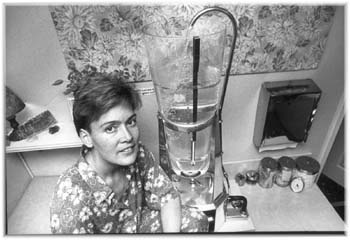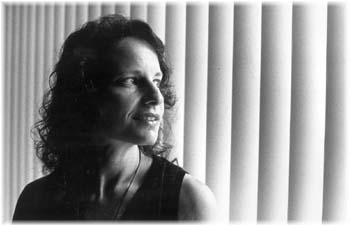![[MetroActive Features]](/features/gifs/feat468.gif)
![[MetroActive Features]](/features/gifs/feat468.gif)
[ Features Index | Metro Santa Cruz | MetroActive Central | Archives ]
Hooked on Colonics
Tube Be or Not Tube Be: Colon hydrotherapist Ahleen Lupo at Four Seasons Hydrotherapy and Consulting Center displays the center's colonic machine that administers the water. Lupo believes colonics, in conjunction with a healthy diet, are the way to better living.
Strict diets and cleansing regimes can be unhealthy
By Mary Spicuzza
ONE END OF THE PLASTIC TUBE is connected to a clear cylinder filled with water. The other tapered endwell, that goes where the sun don't shine. Once properly inserted, the device known as the Dierker gravity-flow unit is turned on. Purified water trickles in through the transparent tube, and the process of internal cleansing begins. The client is in charge of deciding when his or her colon is full, and when a release of fluids is in order. The treatment usually lasts 45 minutes and uses half a cup to two quarts of water.
Perhaps none of this is new information. Perhaps most readers have heard detailed stories of the ins and outs of colon-cleansing techniques. Many, I'm sure, have heard the one about watching the stuff that comes through the clear plastic tube.
Battling trapped mucus to help the rectum do its duty may not sound like ideal table talk or a smooth party ice-breaker. But many locals take every opportunity to talk about their enthusiasm for this activity. They swear colonics can change lives, and they are anxious to share this information. One young man approached me recently in a grocery store and began singing the praises of colonics over a table of cheese-and-cracker samples.
Santa Cruz is a community with many devotees of alternative diets. Here, vegans abound. Fruitarians mingle at raw-foods potlucks, comparing colon-cleansing experiences. Wheat-free, dairy-free macrobiotic diets have a cult-like following, while local meat eaters are known to apologize for their carnivorous behavior like addicts confessing drug habits. Our little town is the epitome of health. Or so we think.
Heidi Guenther, the San Francisco ballerina who died from heart failure caused by anorexia, was the most recent reminder of our nation's difficult struggle with eating disorders. Some health professionals believe extreme preoccupation with diet--an intense refusal to eat many foods--approaches anorexic behavior. There comes a point when radical diets and health regimes can be taken to extremes that do not provide for true well-being. When cleansing the body of toxins is pursued with the vigor of Doctor Strangelove, they say, there is a problem.
For Hannah Barnes the line between a healthy lifestyle and an eating disorder was a blurry one. Barnes, a Wisconsin native who settled in San Diego, enthusiastically supported her boyfriend's decision when he initially got on a health kick. After several months of veganism and avoiding animal products, he decided to become a fruitarian--only eating fruits and the products of flowering plants.
However, Barnes soon began to worry about her boyfriend's obsession with cleansing.
"He eventually lost over 30 pounds, and looked like a skeleton," Barnes says. "He couldn't handle going a day without exercising, but lost his sex drive completely. His friends and family were calling me, begging me to make him eat. He felt sick, but thought it was only because his body was going through a cleansing process. I think he just lost touch with reality.
"His fruitarianism became all about control, control over his body, what and when he ate. I think it was his way of feeling powerful in his life. I once wrote in my journal about eating cookies, and he read it and got upset with me because he wanted me to be 'healthy,' too."
Weight and See: Eating disorder counselor Andrea LoBue warns colonic fans against depending too heavily on these methods of cleansing as a means for weight loss.
Going With the Flow
ANDREA LOBUE, a marriage and family counselor who specializes in eating manifestations of disorders, says they are often control issues. "Having control over one's diet is seen as good, while being out of control is seen as bad and shameful," LoBue says. "I think this is perpetuated by society as a whole. People are rewarded for dieting and losing weight, just as the diet industry fools people into believing that if they lose weight, they will become better people."
Of course, most alternative healers do not prescribe rigidity. Hydrotherapist Ahleen Lupo says she recognizes that some people can get carried away on their quest for health. She urges moderation.
"Some have renamed macrobiotics 'macro-neurotics' because it is too stressful for many of us to follow all the rules," Lupo says. "It becomes a guilt thing, feeling horrible about yourself for eating to much yin and not enough yang. So it wasn't for me, but I know plenty of perfectly healthy macrobiotics."
LoBue also recommends a less intense focus on controlling the body's intake.
"Rather than feeling the fear and frustration of being unable to control life events and other people, many of us distract ourselves by controlling our eating," LoBue writes. "Letting go can be terrifying. But once the feelings pass, it's a much more peaceful way to live."
Four Seasons Hydrotherapy & Consulting's treatment center on upper Laurel Street is small, intimate and immaculately clean. A tiny stream trickles outside the cabin. Inside, soothing music plays, and there is a faint smell of incense and essential oils.
Water swirls inside the Dierker tank. The sign above the colonics table gently reminds clients, "The breath comes in, the breath goes out." Brightly colored glasses for color therapy rest near the table, and cleansing ear candles are also available upon request.
Ahleen Lupo, who opened Four Seasons eight years ago, says she was sick for 10 years before turning to colonics for relief. Lupo says she suffered from chronic hay fever and bad allergies and was constantly medicated.
"I was always taking penicillin, and doctors were regularly injecting cortisone into my nasal passages," Lupo says. "I was in so much pain but assumed it was a permanent part of my life I had no choice but to accept."
A bout of giardia pushed Lupo over the edge of traditional medicine and into the world of colonics. She says she feels anyone who has eaten the "plastic foods common in the American diet," breathed polluted air or been subjected to stress can benefit from a good colon cleansing.
One advertisement for the center proclaims, "Discover your warrior spirit through colon cleansing!" Fans of colonics tend to wax enthusiastic. They say it's made them feel healthier, more energetic, lighter and generally refreshed. Lupo recommends regular colon therapy in conjunction with a healthy diet, consisting mainly of fresh fruit and vegetable juices. But she advises against getting too wrapped up in the idea of purity.
Purge Overkill
A NEW YORK NATIVE in her early 50s who settled in Santa Cruz about five years ago, Judy says colonics have helped her to lighten up about her diet. "A couple of years, ago I got way too radical about health issues," she says. "I didn't let myself enjoy my food. I wouldn't eat sweets or anything I thought was bad for me. It got to the point I didn't want to eat anything."
In the past few years Judy (who preferred that her last name not be used) has become much more moderate. She avoids meat but does eat some fish and chicken. She began exploring colonics on the recommendation of an acupuncturist and has received nine treatments since this past June.
While colonics and raw-foods diets may seem like desperate measures, any colonic hydrotherapist will assure you these are desperate times. Lupo says that more than $400 million was spent on laxatives last year, much of that by people with colon problems.
Colon cancer is currently vying with breast and lung cancer as the worst killer in the U.S. every year.
"We're perfectly willing to take care of our surface appearance," Lupo says. "We brush our teeth, clean out our ears. We worry about orifices people can see but ignore the ones hidden from others."
Not everyone, though, is as ready to go with the colonic flow. Most doctors do not perform or recommend colonics.
Helen Nunburg of Aptos, who has worked as an internist for 17 years, usually suggests high-fiber supplements rather than colonics.
"Alternative practitioners," Nunburg says, "should certainly be consulted if a person is interested in exploring those types of techniques."
And it isn't only the practitioners of Western medicine who are suspicious of colonics. Most doctors of traditional Chinese medicine don't view colonics as necessarily health-inducing.
"The deep treatment should only be used in very toxic, extreme situations," says Joanna Xhao, a teacher at Five Branches School of Traditional Chinese Medicine. "As doctors of Chinese medicine we are very concerned with our patients' qi, or their energy." "We feel a colonic can deplete one's energy, confuse the colon, and wipe out the healthy bacteria of the intestine necessary for proper digestion."
Xhao agrees Americans suffer much internal toxic stress on their bodies but doesn't believe in "the quick, purgative fix a colonic is perceived to provide."
Similarly Xhao, who has practiced medicine for 26 years--13 of them in Santa Cruz--also has reservations about extremely restrictive diets.
"I believe macrobiotics can help some people. But others miss essential nutrients by cutting out all animal products, wheat and certain vegetables." Xhao says. "Chinese medicine is very concerned with heat, and raw foods are hard to digest, often lack accessible protein and are very cooling to a person's body."
Nunburg also believes the question of whether a strict diet is healthy depends almost entirely on the individual. "Fruitarians do not get complete nutrition," Nunberg says, "and vegans tend to have problems getting enough vitamin B-12 without supplements."
Letting Go
ANDREA LOBUE AGREES that whether a behavior is healthy depends on the individual. "I have treated many people who, under the guise of a 'healthy diet,' have severe eating disorders," she says.
"People use everything from colonics to fat-free diets to stomach stapling in order to lose weight," she says.
LoBue, food and emotions expert for America Online, co-founded Inner Solutions in Soquel five years ago with counselor Marsea Marcus. The therapy center urges people to break away from the idea that dieting will automatically make them happy. They instead encourage clients to stop looking for quick fixes and delve into deeper emotional issues that led them into unhealthy eating in the first place. The book, Don't Diet, Live It, co-written by LoBue and Marcus, addresses similar self-esteem issues.
"You can't fix a major engine problem with a new paint job. We ask people, 'What are you really hungry for?' For one person, a macrobiotic diet is sane. For someone else it is restrictive and obsessive," LoBue says. "The main question is, 'What is your motive?' "
Of course no one is saying all macrobiotics have an eating disorder. "But a life where you can only think about controlling what you eat and don't eat is not a life at all," LoBue says. "If you are obsessed, preoccupied, rigid and inflexible with your diet and your health, there is definitely a problem."
Copyright © Metro Publishing Inc. Maintained by Boulevards New Media.

Robert Scheer
Robert Scheer
From the August 21-27, 1997 issue of Metro Santa Cruz.